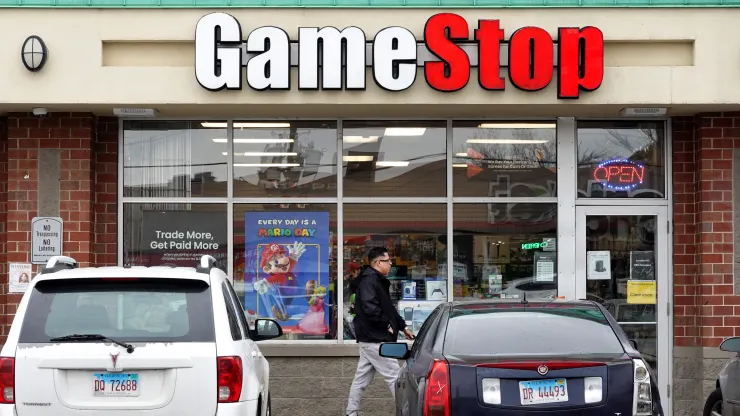Shares of GameStop (GME:NYSE) popped more than 45% in extended trading Tuesday after the video game retailer posted a quarterly profit for the first time in two years.
The Grapevine, Texas-based company reported Net income was $48.2 million and compared with a loss of $147.5 million a year earlier. Earnings per share came in at $0.16, compared with a loss of $0.49 a year earlier.
Net sales fell 1.2% to $2.23 billion in the three months ended Jan. 28, but that was higher than analysts’ projections of $2.18 billion. For the full fiscal year, GameStop saw $5.93 billion in sales, down slightly from $6.01 billion in fiscal 2021.
“GameStop is a much healthier business today than it was in the start of 2021,” Chief Executive Officer Matt Furlong said on a call with analysts. “We have a path to full-year profitability.” The company didn’t offer an outlook for 2023.
GameStop, known for its consumer electronics and gaming merchandise, has struggled with profitability as the games industry has moved away from physical discs to online downloads. The industry has been further hamstrung by supply chain constraints on consoles and a relatively light schedule of new game releases last year. US video game sales dropped 5% in 2022.
One bright spot in the quarterly results was GameStop’s business selling physical collectibles, an area the company has identified as a long-term priority. Sales in that category rose 12% to $313.2 million. Sales in the hardware and accessories category rose 4.6% to 1.24 billion but software sales fell 15% to $670.4 million.
GameStop has been struggling to find a way to post predictable profits for years as many console- and computer-game players have moved to downloading games over the internet, instead of buying the hard copies that the company specializes in selling. Meanwhile, more people have been downloading games on smartphones and tablets and publishers have been releasing more free games that generate revenue from sales of virtual goods.
The new leadership at GameStop, led by chairman Ryan Cohen, which took over in 2021, has tried to diversify by doing more online sales and even starting an NFT market. The company announced a partnership with now-bankrupt cryptocurrency exchange FTX US last fall, only to cancel it two months later. Over the past year, it has pulled back on its e-commerce efforts and returned its focus to getting stores to be more efficient.
Supply chain delays during the pandemic left GameStop with a backlog of inventory that had accrued during previously high demand during the early Covid era. The company reduced inventory to $682.9 million at year end, down from $915 million from a year earlier.
On a conference call, GameStop said that in addition to cutting costs such as by reducing its head count, its latest results reflect efforts to optimize inventory and enhance the customer experience. The company will continue to focus on profitability going forward, including by continuing to reduce its footprint in Europe.
“Although there is a lot of hard work and necessary execution in front of us, GameStop is a much healthier business today than it was at the start of 2021,” said Furlong on the call.
As has been customary for the past two years, GameStop didn’t take any questions from analysts. The company also did not provide financial guidance and has not done so since the early days of the pandemic. This makes it difficult to compare its financial results with Wall Street estimates as very few analysts cover the company.
Retail traders turned GameStop into a meme stock during the pandemic, wildly pumping up its share price based on social media chatter unrelated to the company’s fundamentals. The video-game retailer initially rode on the short-term, meme-stock momentum. It has since leveled out and the company has made progress in right-sizing its business by cleaning up its inventory levels and reworking its cost structure.
Shares of GameStop are down 4.4% so far this year.

